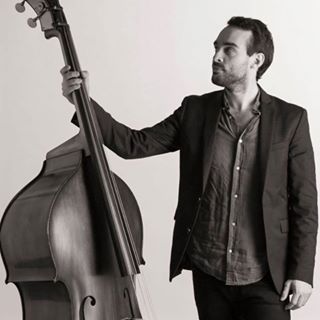James Heazlewood-Dale's journey
February 4, 2021
by Marilyn Brooks
 Australian musicians have become a part of the BOLLI scene. Many members will recall Georgia Luikens, who led several study groups during her time as a Brandeis PhD candidate. We have more recently been fortunate to have with us BOLLI lecturer and Study Group Leader James Heazlewood-Dale, who also hails from the Southern Hemisphere. Raised in Melbourne, he began his studies at the Sydney Conservatorium of Music. James made the decision to pursue a career as a musician and to immigrate to America when, while on a tour of Australia, Maria Schneider, leader of the U.S.-based Maria Schneider Orchestra, invited him to join her ensemble to play the double bass.
Australian musicians have become a part of the BOLLI scene. Many members will recall Georgia Luikens, who led several study groups during her time as a Brandeis PhD candidate. We have more recently been fortunate to have with us BOLLI lecturer and Study Group Leader James Heazlewood-Dale, who also hails from the Southern Hemisphere. Raised in Melbourne, he began his studies at the Sydney Conservatorium of Music. James made the decision to pursue a career as a musician and to immigrate to America when, while on a tour of Australia, Maria Schneider, leader of the U.S.-based Maria Schneider Orchestra, invited him to join her ensemble to play the double bass.
He later received a full scholarship to the Berklee College of Music/New England Conservatory, where he received a Master’s Degree in Jazz Performance. James is currently enrolled in the Brandeis Department of Music where he is writing his dissertation on the topic of jazz and interactive multimedia.
James says that his favorite musical period is the 1960s, perhaps because it includes some of his favorite musicians, including The Beatles, James Taylor, Pete Seeger, and Paul Simon. In high school he listened mostly to pop music and didn’t discover jazz until he enrolled in the Conservatorium. Jazz then became his passion.
He says that his choice of courses to teach at BOLLI always reflects “something that I’m interested in as well as offering me the chance to learn more about that subject.” As one example, consider the lecture he presented as part of BOLLI’s Winter 2020/2021 Lecture Series, “The Music and the Dream—Three Women on a March,” which featured Mahalia Jackson, Marian Anderson, and Odetta Holmes singing at the March on Washington in August 1963. The course was designed to allow both James and class members to learn more about the careers of these remarkable women. All three started by singing in churches, a very common way for African-American musicians to begin their careers, and then branched out into different genres – gospel, opera, and folk, respectively.
James finds teaching at BOLLI to be a wonderful experience. “It’s letting me put together a syllabus and think about how to teach a course in a subject I’m passionate about.” He says his students bring a wealth of knowledge about different subjects to the classes, and that one of the most fascinating things for him is mentioning a performer and learning that a class member once heard that person perform live. “Being able to share what you know and at the same time learn from the class members is part of what makes teaching here so enjoyable, and discussing music with people of diverse backgrounds is very special.”
One of the reasons James likes Boston, and plans to remain, is that it’s a place where he’ll be able to combine teaching and performing. Before COVID-19 he performed nearly every night at various sites throughout New England and New York, and he hopes to return to the stage before too long. Regarding his desire for a dual career, James says that “academics and performance are separate but can come together. Each has something to offer the other.” Once he receives his PhD, he hopes to combine jazz and interactive multimedia, the topic of his dissertation. His enthusiasm for this combination is reflected in the topic of the course he’ll be teaching during BOLLI’s spring semester: “Jazz on the Big Screen: Exploring the Relationship Between Jazz and Film.”
Following graduation, James’s goal is to teach at a New England college where he’ll be able “to enhance his students’ knowledge and enjoyment of music, and help them learn to hear and appreciate the nuances of every musician and instrument in a band.” During the very first session of “The Music and the Dream,” James remarked that “the more you know (about music) the more you appreciate it, and that applies to me as well as to members of the class.” Members of his BOLLI audiences are grateful for his ongoing efforts to enhance our listening knowledge and pleasure.